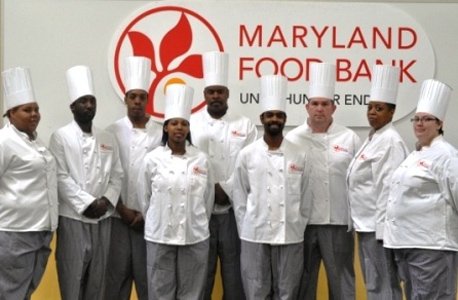BALTIMORE — Food has changed the lives of several Baltimore area adults; including the dozen who on Friday, December 6, 2013 became the latest to graduate from the Maryland Food Bank’s culinary training program for low-income individuals.
Brandy Brown, Teneisha Brown, Briana Coley, Kenneth Dunn, Marc Freeman, Donaha Gervin, Erica Graham, Daniel Johnson, Andrea Kelly, Shanel Robinson, Paul Royal and Jasmine Shaw eagerly accepted their diplomas at a ceremony attended by Deborah Flateman, the president and CEO of the Maryland Food Bank, Aida Blanco, the executive chef at FoodWorks, and Andy Hartman, of the Charles T. Bauer Foundation, which serves as a primary financial sponsor of the program.
“Graduation is the culmination of all of their hard work and most of them are leaving with new jobs,” said Kate Sam, the food bank’s director of communication.
The graduation marks the twelfth class to complete the program, where students learned a wide range of culinary techniques to become certified in ServSafe Food Sanitation Management, a leading industry standard for quality and food safety, while producing healthy meals for less fortunate local residents.
Located at Halethorpe Farms Road in Baltimore, the Maryland Food Bank operates as a nonprofit, hunger-relief, organization which helps lead the movement to end hunger throughout the state. For more than three decades, food bank officials have partnered with communities across Maryland to distribute food to individuals and families in need. Through carefully crafted programs, the food bank’s goal is to meet the immediate needs of residents while simultaneously working to find long-term solutions to reduce hunger statewide, according to Sam.
The Maryland Food Bank operates three facilities in Baltimore, Salisbury and Hagerstown and currently distributes 79,000 meals per day and nearly 29 million each year. More than 289,000 FoodWorks meals were distributed to families in need last year with more than half going to children in youth programs, officials said.
“We have a network of soup kitchens, pantries, schools and other community-based organizations through which food is distributed throughout 22 counties, including Baltimore City, and Somerset, Wicomico and Washington counties, which are some of the most food-insecure regions in Maryland,” Sam said.
Most graduates have previously been recipients of the services offered at the Maryland Food Bank and many have gone on to land kitchen jobs with decent wages, Sam said.
“I think the highest paid graduate that we know of, makes about $23 per hour,” said Sam. “A lot of our students have been referred to us by soup kitchens and pantries, and are people who have been through struggles in their lives, so this is a welcome second chance for them and we help them through the program and to get jobs and so many have done so well.”
The 12-week culinary skills program provides hands-on training where skilled professionals help prepare the students for job readiness during classes, which are held Monday through Friday from 7:30 a.m. to 4:30 p.m.
At graduation, students receive a professional package consisting of a complete culinary uniform, professional cooking textbook, and a ServSafe certificate, certifying that they have learned proper cooking techniques and methods, proper commercial kitchen equipment, job readiness and job placement assistance.
Many of the graduates have landed jobs at places such as the Baltimore Country Club, BRIO Tuscan Grill and Charlestown Retirement Communities among others.
“The feedback has been great,” Sam said. “We’ve received a lot of support from local lawmakers and not only are the graduates inspired, but their families are as well.”
